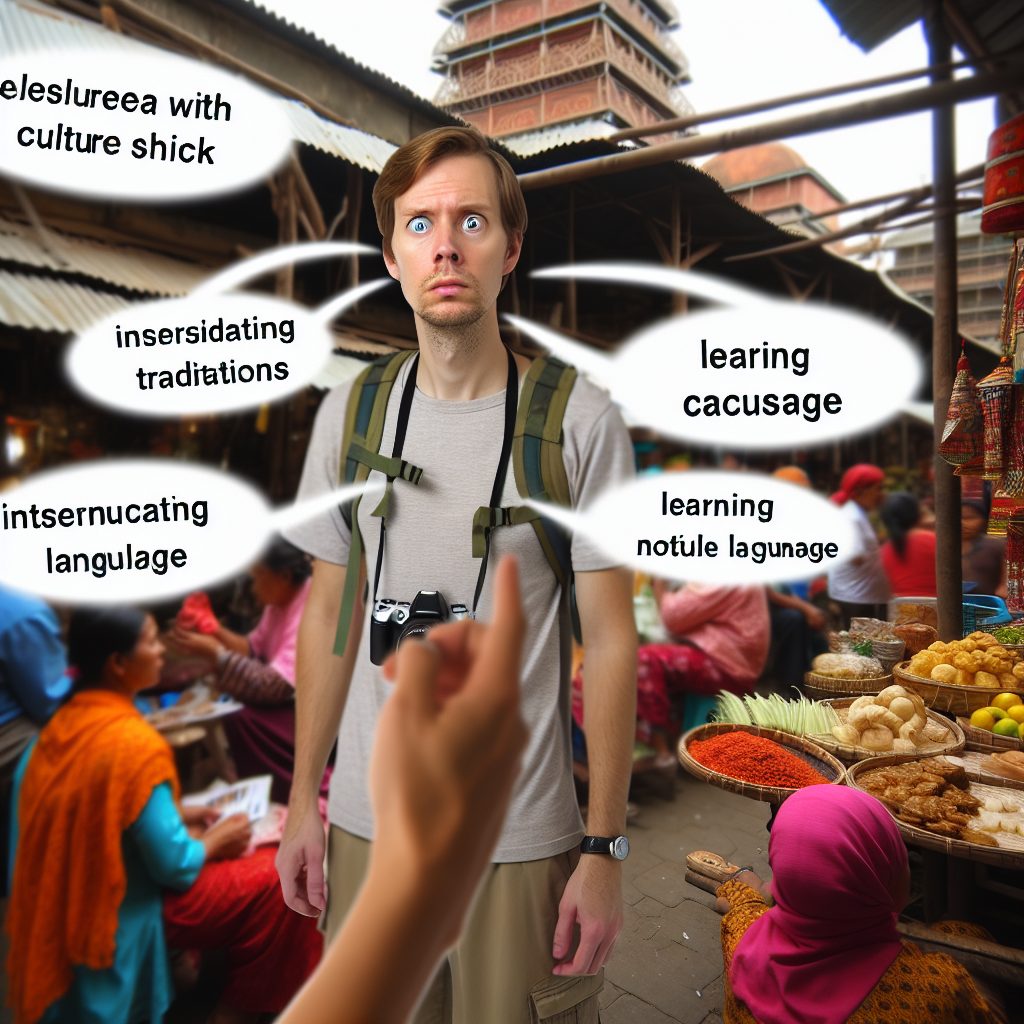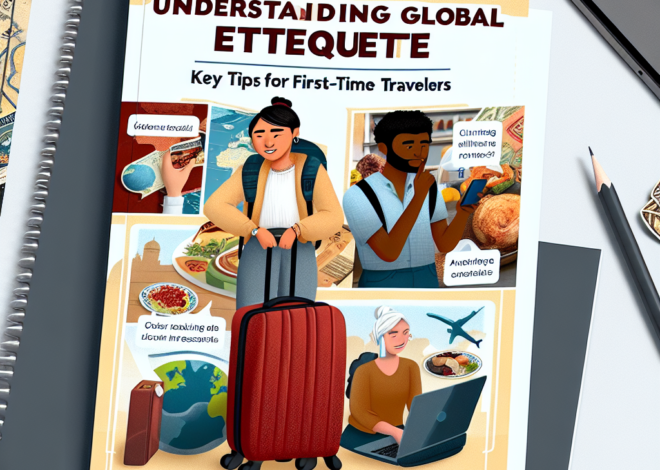
How to deal with culture shock when moving overseas
-
Table of Contents
“Embrace the New, Cherish the Different: Navigating Culture Shock Abroad”
Introduction
Dealing with culture shock when moving overseas is a common challenge faced by many individuals as they transition into a new environment with distinct social norms, languages, and daily practices. Culture shock can manifest as a series of emotional, psychological, and physical reactions to the unfamiliar aspects of the new culture, ranging from mild confusion and discomfort to severe anxiety or disorientation. Understanding and mitigating the effects of culture shock is crucial for a successful adaptation and can enhance the overall experience in a foreign country. This process involves recognizing the stages of culture shock, employing effective coping strategies, and actively engaging with the new culture to foster personal growth and understanding.
Understanding And Embracing Cultural Differences
Culture shock is an experience that many individuals face when they move overseas, characterized by a mixture of emotions that arise from encountering a way of life starkly different from one’s own. Understanding and embracing these cultural differences is not only crucial for a smooth transition but also enriches one’s personal growth and global perspective. This article explores practical strategies to effectively deal with culture shock and integrate into a new cultural environment.
Initially, the novelty of relocating to a foreign country can be thrilling. However, as the excitement wanes, the reality of the differences in language, customs, and social norms can become overwhelming. It is common to feel disoriented and sometimes isolated. Acknowledging these feelings as a normal part of the adaptation process is the first step in overcoming culture shock. Recognizing that these emotional responses are temporary and part of a learning curve can help in managing expectations and reducing anxiety.
Education plays a pivotal role in bridging cultural gaps. Before moving, and continuing after arrival, invest time in learning about the host country’s history, traditions, and social etiquettes. This not only shows respect for the new culture but also minimizes misunderstandings and faux pas. Language is a key component of culture; hence, learning the local language, even at a basic level, can significantly ease communication barriers and foster a deeper connection with community members.
Moreover, maintaining an open mind is essential. Approaching differences with curiosity rather than judgment allows one to appreciate the nuances of the new culture. This openness can lead to discovering new perspectives and practices that may actually resonate with one’s own values and lifestyle. For instance, the communal eating practices in some cultures, which might seem intrusive initially, can later be appreciated as a warm and inclusive social practice.
Building a support network is also crucial in mitigating the effects of culture shock. This network can include fellow expatriates who can provide advice based on their own experiences, as well as locals who can help navigate the subtleties of their culture. Engaging with the community through clubs, classes, or religious groups not only combats loneliness but also enhances cultural understanding and integration.
Furthermore, it is important to find a healthy balance between adapting to the new culture and retaining one’s own cultural identity. This balance helps in developing a bicultural or multicultural identity, where one can enjoy the best of both worlds. It is beneficial to continue practicing cherished traditions from one’s home country while adopting new ones from the host country. This approach not only eases the sense of loss often associated with leaving one’s homeland but also enriches one’s cultural experience.
Lastly, patience is key in the process of adjusting to a new culture. It takes time to understand and feel comfortable in a different cultural setting. Setbacks and frustrations are part of the journey and should be viewed as opportunities for learning and growth.
In conclusion, dealing with culture shock when moving overseas involves a combination of education, open-mindedness, community engagement, and patience. By embracing these strategies, expatriates can not only navigate but also appreciate the complexities of their new cultural surroundings, turning what might initially seem daunting into an enriching life experience.
Establishing A Support Network Abroad
When relocating to a new country, the initial excitement of exploring a different environment and culture can sometimes be overshadowed by the overwhelming feeling of being an outsider. This phenomenon, known as culture shock, can manifest in various forms, from mild discomfort to severe disorientation. However, one effective way to mitigate these feelings is by establishing a support network abroad. This network not only provides emotional backing but also aids in understanding and integrating into the new culture.
Building a support network in a foreign country might seem daunting at first, but it is crucial for a smoother transition. Start by connecting with people who share similar interests or are in similar situations. Expatriate communities, in particular, can be incredibly supportive since they are composed of individuals who have undergone or are currently experiencing similar challenges. These communities are often active in organizing social events, which are perfect opportunities for newcomers to meet people and make friends. Engaging in these social gatherings allows one to exchange valuable insights and practical advice about living in the new country, from navigating bureaucratic processes to understanding local customs.
Moreover, leveraging social media platforms and online forums can significantly ease the process of building a support network. Many countries have dedicated groups and forums for expatriates where members share experiences, arrange meetups, and offer support. These digital platforms are accessible and can be a great starting point for building connections even before moving. By participating in discussions and reaching out to members, one can gain a sense of community and receive encouragement from others who empathize with the challenges of adjusting to a new culture.
In addition to expatriate groups, it is equally important to forge relationships with locals. This can be achieved by taking part in community activities or enrolling in classes that interest you, such as cooking, dancing, or language classes. Such interactions provide a deeper understanding of the local culture and customs and help in breaking down cultural barriers. Learning the local language, in particular, is a powerful tool in this regard. It not only facilitates daily interactions but also demonstrates respect towards the new culture, which can, in turn, foster better relationships with local residents.
Furthermore, if you are relocating for work, your workplace can be a valuable resource for building your support network. Colleagues who have been in the country longer can provide insights into the work culture and offer practical tips for settling in. Some organizations also offer mentorship programs to help international employees adjust more effectively. Engaging actively at your workplace and participating in any social clubs can further expand your network and help in adjusting to your new environment.
Lastly, it is essential to maintain regular contact with friends and family back home. They provide a vital emotional anchor and can help you feel connected despite the physical distance. Modern technology offers various ways to stay in touch, ensuring that you can reach out for support whenever needed.
In conclusion, while moving overseas can be challenging, establishing a robust support network can significantly ease the transition. By connecting with both expatriates and locals, leveraging online resources, engaging in community activities, and maintaining ties with home, you can build a network that not only helps in navigating the initial challenges but also enriches your experience abroad. This network becomes a crucial part of your journey, providing both practical support and deeper cultural immersion.
Maintaining Cultural Practices From Home
When relocating to a new country, the excitement of exploring a different environment and lifestyle is often accompanied by the challenge of adapting to unfamiliar cultural norms and practices. This phenomenon, known as culture shock, can manifest in various forms, ranging from mild confusion and discomfort to profound disorientation and stress. One effective strategy to mitigate these effects involves maintaining cultural practices from one’s homeland, which can serve as a comforting anchor in a sea of change.
Maintaining cultural practices while abroad not only soothes the initial discomfort but also strengthens one’s identity and sense of belonging. Engaging in familiar rituals and customs can provide a psychological respite from the barrage of new experiences and expectations encountered in a foreign setting. For instance, continuing to celebrate traditional holidays or festivals can recreate a sense of community and continuity that might otherwise be missing in a new country.
Moreover, cooking traditional dishes from one’s homeland is another potent means of maintaining cultural ties. Food is a powerful cultural marker and recreating flavors from home can be immensely satisfying. It not only helps in preserving one’s cultural identity but also offers an opportunity to share one’s heritage with new friends or neighbors, thereby fostering a better understanding and appreciation among diverse groups.
Language, too, plays a crucial role in maintaining one’s cultural heritage. Regularly speaking one’s native language, whether with family and friends back home via digital communication tools or with fellow expatriates in the new country, helps keep the language alive and vibrant. It also assists in retaining a strong connection with one’s cultural roots and provides emotional comfort.
Additionally, participating in cultural or religious communities can offer a supportive network that resonates with one’s own cultural practices and values. Most urban centers around the world host a variety of cultural associations that bring together individuals from similar backgrounds. These groups often organize events that celebrate their unique customs and traditions, providing a platform for members to engage with their culture in a collective setting.
However, while it is beneficial to maintain one’s cultural practices, it is equally important to remain open to the new culture. Balancing the preservation of one’s own cultural identity with the adoption of new practices is key to a successful adaptation process. This balance helps in developing a bicultural identity, where one can appreciate and integrate the best aspects of both cultures.
In conclusion, dealing with culture shock when moving overseas involves a delicate interplay between preserving one’s cultural heritage and embracing the new environment. By maintaining cultural practices from home, individuals can alleviate feelings of alienation and forge a sense of continuity in their lives. At the same time, openness to the new culture not only enriches one’s experience but also facilitates smoother integration into the new society. Thus, the journey of moving abroad, despite its challenges, can become a fulfilling experience of personal and cultural growth.
Learning The Local Language And Customs
Moving overseas can be an exhilarating experience, yet it often comes with the challenge of navigating through the unfamiliar waters of a new culture. One of the most effective ways to mitigate culture shock is by learning the local language and customs, which not only eases daily interactions but also enriches the expatriate experience.
Starting with the language, it is widely acknowledged that communication is the cornerstone of understanding in any social context. Learning the local language, even at a basic level, can significantly reduce feelings of alienation and frustration. It opens doors to more meaningful interactions with locals, showing respect for their culture and an earnest effort to integrate. Language barriers can lead to misunderstandings and a sense of isolation, so by acquiring the new language, one can more effectively navigate shops, public transport, medical appointments, and social gatherings, which are all integral to settling in comfortably.
Moreover, language is deeply intertwined with culture; hence, learning the language naturally leads to a greater understanding of local customs and nuances. For instance, idiomatic expressions and proverbs offer insights into the values and historical context of the area. This understanding fosters a deeper appreciation of the community’s ways of life and can diminish the initial shock of cultural differences.
Transitioning from language to customs, it is equally important to observe and participate in local traditions and social practices. Every culture has its unique set of norms and etiquette, from dining manners and dress codes to greeting styles and punctuality expectations. By observing these customs, one can avoid potential faux pas and build stronger relationships with native residents. For example, in Japan, it is customary to remove shoes before entering someone’s home, a practice that is less common in many Western countries. Knowing and respecting such customs not only shows a readiness to adapt but also helps in being perceived positively by the local community.
Participation in local festivals and public holidays offers another excellent opportunity to immerse oneself in the culture. These occasions are often steeped in history and are a vibrant expression of the community’s identity and values. They provide a platform to interact with locals in a more relaxed and open environment, facilitating deeper connections and understanding. Engaging in these activities also demonstrates an openness to accept and celebrate cultural differences, which is crucial in overcoming culture shock.
Furthermore, it is beneficial to establish a local support network that can guide one through the nuances of the new environment. Connecting with fellow expatriates who have undergone similar experiences can provide a sense of camaraderie and shared understanding. At the same time, forming friendships with locals can offer authentic insights into the cultural subtleties and everyday life of the community. These relationships can be instrumental in providing support and advice on how to navigate the challenges that come with living in a foreign country.
In conclusion, while moving overseas can present significant challenges, particularly in terms of adapting to a new cultural environment, taking proactive steps to learn the local language and customs can greatly alleviate the impact of culture shock. This approach not only facilitates smoother daily interactions but also enriches the overall experience of living abroad. By embracing the language and traditions of the new country, expatriates can transform their journey into a rewarding adventure of cultural discovery and personal growth.



